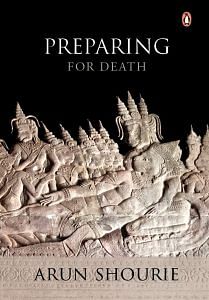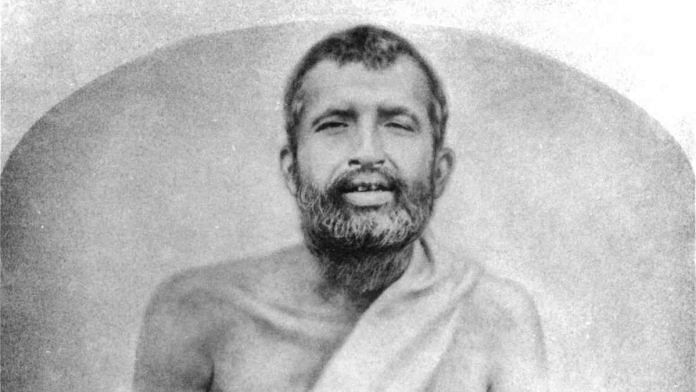Sri Ramakrishna was innocent like a child—he ate little; on days he would say he wanted to eat a particular thing, ‘brinjal soup’, and when it was made, like a child who has already lost interest in a toy he was longing for, he would take a morsel or two, a sip or two and forget eating altogether. He was gullible too as a child: when he became unwell, he would take any and every medicine or decoction, turn himself over to whichever doctor someone suggested. Even as he was wracked by unbearable pain from his final illness, this suggestibility remained, and he himself recognized it: the cancer has advanced to a perilous state; yet another doctor has been brought to examine him; Sri Ramakrishna is explaining to him how medicine does not agree with him, how his hand writhes in pain, his breathing stops if he touches money, how he cannot lay aside anything for the morrow—how a bit of opium that a devotee had given him to ease his troubled stomach, how a few mangoes someone gave made him lose his way, and how he just couldn’t proceed till he threw them away.
A sore throat and then…
It all started as just a sore throat. It wouldn’t heal. Those around him ascribed it to his preaching and instructing incessantly: ‘the clergyman’s sore throat’. One evening, the young disciples were at a dinner that had been arranged by a devotee. Everyone was hoping that Sri Ramakrishna would join them. Instead a messenger came: the Master cannot come, he is not well, his throat bled earlier today. The moment they heard that Sri Ramakrishna’s throat had bled, their spirits fell.
Narendra, the future Swami Vivekananda, became ‘particularly dejected’, and exclaimed, ‘He, with whom we are so happy, is perhaps going to pass away this time. I have known from reading medical books and questioning doctor friends that this kind of throat disease gradually develops into cancer. Hearing of the bleeding today I suspect the disease to be that; the medicine for this disease has not yet been discovered.’
Doctors were called to diagnose the ailment: it is ‘rohini’, the local name at the time for cancer. Soon, Sri Ramakrishna couldn’t eat any solid food. Some days, he could eat only a little farina—a variety of rice pudding. The amount of even this that he could eat kept falling so much so that he would feel really happy if on some day he could eat a bit more of it.
Also read: Targeting a single cell that begins tumours can revolutionise cancer treatment
Progressive weakening
All too soon, Sri Ramakrishna could not walk from his room to the main temple that housed the image of the centre of his life, his beloved Divine Mother, nor to the other temples in the complex: he would join hands in the direction of the deities and convey his respects from afar. Mere talking inflamed the pain—and the doctor told him to keep silent as much as possible. But the moment someone—whoever had come to visit him—broached the subject, Sri Ramakrishna would talk at length about God and spiritual matters. The doctor said that the states of samadhi that Sri Ramakrishna so often went into also worsened the disease. And yet, the doctor himself, Dr Mahendralal Sarkar, a sceptical visitor at first, proud of his rationalism and erudition, fell under the Master’s spell: pressing others not to tire Sri Ramakrishna with talk, he himself began spending six to seven hours at a time in Sri Ramakrishna’s presence.
He turned to Sri Ramakrishna: ‘The illness you are suffering from does not permit the patient to talk with people. But my case is an exception. You may talk with me when I am here.’ (All laughed, ‘M’, the diarist to whom we owe the most authentic and extensive account of what it was like to be around Sri Ramakrishna, noted in his diary.)
Sri Ramakrishna had had an enchanting voice, his singing bewitched listeners—but soon he could not sing. That day, Sri Ramakrishna pleaded with the doctor like the child he was: ‘Please cure my illness. I cannot chant the name and glories of God.’ ‘Meditation is enough,’ the doctor observed. ‘What do you mean?’ Sri Ramakrishna exclaimed. ‘Why should I lead a monotonous life? I enjoy my fish in a variety of dishes: curried fish, fried fish, pickled fish, and so forth! Sometimes I worship God with rituals, sometimes I repeat his name, sometimes I meditate on Him, sometimes I sing his name and glories, sometimes I dance in His name . . .’
‘A skeleton . . . bent like a bow’
Soon Sri Ramakrishna was reduced to conveying most of what he wanted to say by mere signs and gestures. He started losing weight—he was about 5 feet 91⁄4 inches tall, and ‘fairly stout’, but soon, ‘M’ recalled, he became ‘a skeleton’. In the last few months his ‘body was so emaciated that it appeared to be bent like a bow’.
We should have a European doctor examine him, the devotees felt. As was usual with him, Sri Ramakrishna readily agreed. Little came of this. For one thing, Sri Ramakrishna’s body was too delicate to withstand allopathic medicines. Homeopathic treatment was chosen instead. Doctors replaced doctors, new ones were added. Various homeopathic medicines, various combinations were tried. What those who attend on patients with ineradicable disease see so often transpired in his case also: every time a new medicine was tried, or a new doctor inducted, or something was added to the diet—from kid meat to some new ingredient in the soup—Sri Ramakrishna’s health would seem to improve, but just a few days later, the disease would have resumed its relentless march.
Also read: Let’s not forget cancer treatment – message from oncology summit held in the shadow of Covid
Cauliflower in the soup
In their earnestness, the doctors would search for the reason on account of which the new medicine had not yielded the effect they were certain it would—on occasion their deductions sparked much mirth in the Master, in spite of his rapidly deteriorating condition:
It was autumn, the time of the worship of Sri Durga in Bengal. At that time the illness of the Master varied from day to day, increasing on one day and decreasing on others. The medicine was not producing the desired result. One day when Dr. Sarkar came to examine him, he found the disease to be aggravated. He searched for the cause, and had Sri Ramakrishna recount everything he had eaten. ‘He had had his usual rice-gruel, soup and milk in the morning, and milk and liquid food like barley- water in the evening.’ The doctor was not satisfied—‘there must have been some departure from the prescription he declared. Which vegetables were used in the soup?’ The Master: ‘There were potatoes, green plantains, eggfruits and also a piece or two of cauliflower.’
‘Ah!’ exclaimed the doctor with a start. ‘You have taken cauliflower! Here, you see, is grave irregularity. Cauliflower is very hot and difficult to digest. How many pieces have you eaten?’
Sri Ramakrishna explained that he had not eaten even a single piece, that those one or two pieces were just in the soup. ‘It is immaterial whether you have actually eaten them or not,’ the doctor pronounced, ‘but there was certainly the juice of the cauliflower in the soup. Your digestion has, therefore, been impaired and the disease has increased today.’
Sri Ramakrishna expressed his reservations: he had not eaten any cauliflower; there was no disorder in his bowels—‘it is difficult to accept that the disease has worsened because of a little juice of it in the soup.’
The doctor was not one to give in: ‘None of you have any idea as to how much harm can be done by some slight alteration.’
Also read: ‘Deeply hurtful’ — why Ramakrishna Mission is not happy with Modi’s CAA comments in Belur
‘A villain’ of a doctor!
Doctor Sarkar comes and examines him: to verify the condition of his throat, he pulls Sri Ramakrishna’s tongue—this makes Sri Ramakrishna wince in pain, so much so that he once complains to another doctor that Sarkar is ‘a villain’, that he pulls his tongue as if he were a cow. At times, Sri Ramakrishna insulates himself from this pain: ‘What wonderful control he had over every nerve and muscle of the body!’ Swami Premananda recalled. ‘When the cancerous tumour in his throat was washed, which caused such terrible suffering, he would ask us to wait for a moment and then he would say, “Now wash.” Then he would feel no pain or suffering.’ At others, the pain lacerates him. He would be waiting impatiently for the doctor. And when the doctor arrived, he would plead with him like a child to do something to lessen the pain.
And so the painful nights and days continue. Sri Ramakrishna becomes more and more emaciated. Most of the time, he can convey his questions and requests by signs alone. The small band of disciples spend themselves attending to his needs.
 This excerpt from Preparing for Death by Arun Shourie has been published with permission from Penguin Random House India.
This excerpt from Preparing for Death by Arun Shourie has been published with permission from Penguin Random House India.




Its a pity that in this land of Ayurved, people have to suffer and die like this.
Sir what was the price at which AIRPORT CENTAUR MUMBAI was sold.
Was it RESOLD by the buyer at what price and within how many months.
What is your views on that.
Sir a brilliant anti corruption crusader can certainly answer it Without fear.
It is nice to read something from Arun Shourie on a non-controversial topic. Good article. Even Sri Ramakrishna’s biographers haven’t captured so many details of his last days.